-
MILL VALLEY FILM FESTIVAL Oct. 6-16, 2016

The Festival, in Marin County, in Mill Valley and San Rafael, in Northern California, in the greater San Francisco Bay Area is presented by the California Film Institute. It started in 1977.
The 39th Mill Valley Film Festival will take place October 6–16, 2016.
General Film Forum for MVFF 2016
Links to reviews:
Aquarius (Kleber Mendonça Filho 2016)
After the Storm//Umi yori mo mada fukaku (Hirokazu Koreeda 2016)
Solo/Assolo (Laura Morante 2016)
Bleed for This (Ben Younger 2016)
Certain Women (Kelly Reichardt)
Christine (Antonio Campos 2016)
Company Town (Deborah Kaufman, Alan Snitow 2016)
Confessions, The/Le confessioni (Roberto Andò 2016)
Death By Design (Sue Williams 2016)
Do Not Resist (Craig Atkinson 2016)
Egon Schiele—Death and the Maiden/Egon Schiele: Tod und Mädchen(Dieter Berner 2016)
In Dubious Battle (James Franco 2016)
Jeremiah Tower: The Last Magnificent (Lydia Tenaglia 2016)
Keeper (Guillaume Senez 2016)
Land Legs/Tempête (Samuel Collardey 2015)
Long Night of Francisco Sanctis (Andrea Testa, Francisco Márquez 2016)
Neruda (Pablo Larraín 2016)
Nine, The (Katy Grannan 2016)
Occupy, Texas (Jeff Barry 2016)
Paterson (Jim Jarmusch 2016)
Salesman, The/فروشنده [Forushande] (Asghar Farhadi 2016)
What's in the Darkness/Hei Chu You Shen Me (Wang Yichun 2016)

Last edited by Chris Knipp; 02-01-2018 at 06:19 PM.
-
DO NOT RESIST (Craig Atkinson 2016)
CRAIG ATKINSON: DO NOT RESIST (2016)
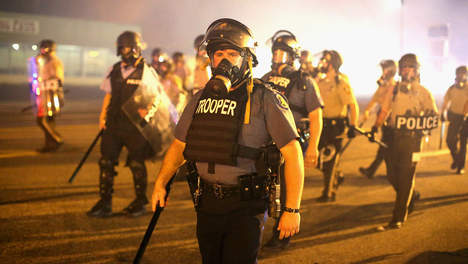
POLICE IN FERGUSON, MISSOURI FROM DO NOT RESIST
A disturbing documentary about "The crisis of police militarization"
Today's American war machine produces "war surplus" like never before. And the government is giving it to local police departments. This means the growing militarization of police: they're increasingly over-supplied and over-armed. And because equipment on hand is likely to be used, that's dangerous, especially since they are often not taught how to use it. This is what we seem to be seeing in the way the police invaded neighborhoods like an infantry division in Afghanistan after the Boston Marathon bombing in 2013, and the way overwhelming force, troops, weapons, and tear gas, was brought out against protesters in Ferguson, Missouri in 2014 after the killing of unarmed teenager Mike Brown by police officer Darren Wilson. Sometimes the phenomenon seems just ludicrous, as we see here when the city council of Concord, New Hampshire votes, against citizens' voiced protests, to accept the gift of a $250,000 "Bearcat" attack vehicle - for a place that has a total of two homicides since 2004. But it's not funny when Atkinson shows us a giant military vehicle rumbling through the little New England town, and such an event is not a fluke but increasingly the way things are. It seems Atkinson doesn't want to propose a solution, just mainly to scare us. But he does a very good job of that. And being the co-cinematographer of the visually elegant Detropia, Atkinson fills his film with intense moments and striking, rough-but-handsome images.
Fact: Homeland Security has given US police deparments $34 billion in grants to buy military-style equipment. The Department of Defense gave $5 billion in free equipment to them. Atkinson's film shows that "SWAT" (Special Weapons and Tactics) teams are equipped much like military assault forces now, and the use of them, with their greater numbers and outsize military vehicles, is increasing. They are hired in to "sweep" a "scene" where illegal drugs are suspected to be dealt or stored. The filmmakers chronicle such a SWAT team "drug bust" in South Carolina, routine there, apparently, where the "catch" turns out to be a young black man with dreads and a day pack with a few loose buds of marijuana. He is released that night, but probably over a thousand dollars worth of damage has been done to a window of the family's house, and they have terrorized.
According to an informative May 13, 2016 article about this film and its subject by Dexter Fillkins for The New Yorker online, entitled "Do Not Resist and the Crisis of Police Militarization," Atkinson's personal starting point was the legally dubious Boston police response to the Tsarnaev brothers' Boston Marathon attack, which overrode civil liberties in homes and neighborhoods and treated them, as mentioned, very much like an enemy combat zone. But in this film, it is the police riots against the demonstrators in Ferguson in 2014 that are constantly referenced throughout, and he shows Senate hearings that resulted, showing that those events awakened government officials to how "law enforcement" was overriding civil liberties on a massive scale. The government somehow gave out 12,000 bayonets to local police departments, someone points out. What for? The Homeland Security rep has no answer.
The most unnerving person in the film is Col. Dave Grossman, a popular motivational speaker for military and police audiences. Grossman, for one thing, blurs the line between military and police. He believes those uncomfortable with the heavy arming of local police should be lined up and shot. He tells cops their job is to do violence, and he encourages him by saying that after a day of heavy assaults they'll have their best sex in months.
The windup is a focus on independent security firms. They use drones to surveil an entire community. Current equipment - and a woman police officer in her vehicle demonstrates it - can identify any car on the road, and if it can get a fix on people's faces, it can use face-recognition technology to identify them and look up their records, and this is legal, because they're in public. Other "experts" can use computerized statistical analysis to tell people if their yet unborn child is, or is not, likely to be charged with murder by the age of eighteen. And if drones that attack do so more surely running by themselves than when being piloted remotely by a human, isn't it better to let the computer do the job?
This reminded me of a quote from the great John Le Carré's latest novel, A Delicate Truth - about a related topic, the commercialization of warfare. It's spoken by Jay Crispen, the despicable head of an independent contractor "security firm" called Ethical Outcomes. The burden of the book is a failed British government operation involving Ethical Outcomes that wasted a few millions with no result other than the killing of two innocent civilians. Crispen scoffs at this concern over the two deaths. "Give me a Predator drone and a couple of Hellfire missiles," he says, "and I’ll show you what real collateral damage looks like."
Thanks to cooperation between the FBI, Homeland Security, and your local police force, Predator drones and Hellfire missiles are coming your way. The message of Craig Atkinson's unnerving film is that things are only going to get worse.
Do Not Resist won the Best Documentary prize at the Tribeca Film Festival this year, and its important warning of the dangerous growth of police militarization parallels that of another new documentary, Ava Ava DuVernay's The 13th, this year's opening night film for the New York Film Festival, which treats the mass prison warehousing of young African Americans as an extension of slavery. Both of these phenomena can be seen as terrible inroads on civil liberties. Or they can be seen as merely aspects of economics, whose "supply-side" version argues that economic growth is best fostered by investing in capital and lowering barriers on production of goods and services. Militarizing local cops and growing prisons invests in capital and moves goods and services. It makes somebody a lot of money, chiefly government suppliers and independent contractors. It also costs taxpayers a lot. The degree to which war is pure business for some became clear, if it wasn't before, during Bush's invasion of Iraq. Collateral reading might be Naomi Klein's book The Shock Doctrine: The Rise of Disaster Capitalism. Atkinson's film focuses on the militarization of American police. Unfortunately, American documentaries sometimes forget to see beyond the USA. But this phenomenon of police militarization is happening in many other places, as in fact is the use of American independent war contractors described realistically in Le Carré's novel.
Do Not Resist, 72 mins., debuted at Tribeca 14 April 2016, winning the Jury Best Documentary Feature award, and showed at a handful of other documentary festivals (Mill Valley Film Festival Oct. 9 & 12, 2016). Opening 14 Oct. in Los Angeles and Pasadena, national rollout following; 21 Oct. at Roxie Cinema in San Francisco. US limited theatrical release begins at Film Forum, NYC 30 Sept. 2016.
-
DEATH BY DESIGN (Sue Williams 2016)
SUE WILLIAMS: DEATH BY DESIGN (2016)
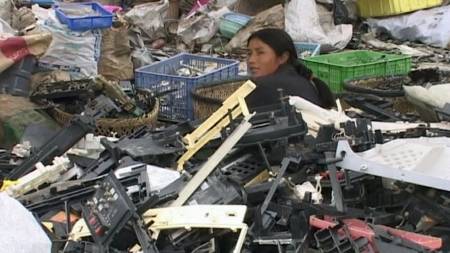
The terrible toll that tech takes
This is a film about the dark side of tech and are you surprised that Apple is the biggest villain? A mostly talking heads documentary can still be very valuable, and Sue Williams' film is living proof. So while the film has plenty of atmospheric and revealing film footage of customers, workers, and (damaged or damaging) environments, what counts most in Williams' film are the people who address the camera. Death by Design is a simple no-nonsense film, but neatly edited with elegant graphics. It's essentially an instructional film about a subject that it's urgent to know about.
Ma Jun, a remarkable man who founded - and is - the Institute of Public Environmental Affairs of China, explains that more than 60% of China's groundwater is not suitable for human use. Ted Smith, another pioneer, a Stanford lawyer and environmental activist who founded Silicon Valley Toxics Coalition, reports on the toxic chemicals stored in Silicon Valley that have entered the ground and says the EPA Superfund program requiring environmental cleanup of factory damage is more intensive in Silicon Valley than anywhere else in the country. All the big tech company Silicon Valley locations are Superfund sites, he says, and cleanup will take not decades but centuries. This will come as news to most of us even who live in or near Silicon Valley.
More about this comes from Amanda Hawes, a lawyer on a team that brought a class action against IBM in the Nineties for workers with health problems from chemicals used in company production. We meet a woman who cares for her son born with severe developmental disability due to her exposure to chemicals 30 years ago. (Mark, the son, is not a "talking head." It's his body and his helplessness that speak.)
Since 1999, the consumer electronic gadgets have snowballed, with severe consequences. Scott Nove, Worker Rights Consortium, explains how outsourcing enables companies like Apple to bypass human safety rules and allow young poor workers from the country to be pushed to the point of suicide in China so 100 million iPods can be sold or a million iPhones can be delivered in a week.
In country, we meet Li Quiang of China Labor Watch: workers' pay is so low it accounts for only 1% of iPhones' cost. The film shows young Chinese assembly line electronics workers, and a few speak to the camera about the pressures to produce and work long hours. Foxconn is the big Chinese Apple supplier, we learn, biggest private employer in the country, over a million workers. Twelve hour days, 30 days without a day off: that's the kind of slave labor that produces the iPhones, iPads, etc., that Americans are so addicted to. Workers died in an explosion from iPad backing in a Foxconn factory.
Garrett Brown, an occupational health and safety expert, comments on this. So does Scott Nove. They both say Apple knows exactly what it is doing and Foxconn's abuses and foul-ups are unconscionable.
Next comes disposability of product. Apple products are designed not to last. New iPhones and laptops have batteries you can't swap out, so you have to replace the entire product in a year or two (if you want it to work on battery charges) and make the company richer. There are opponents, like iFixit - Luke Soules is a young co-founder - which helps people fix the products instead of replacing them. Obviously this is one of the big parts of the problem: too many products, and the number of products could be curtailed. But the tech industry is secretive, exploitive, wants to own the product even after you buy it. Not possible in other industries: a car manufacturer can't prevent car owners from replacing their tires. Luke goes to China and director Williams follows him there. Alex Li is his local translator, who helps him visit multiple circuit board manufacturers in Shenzhen before he finds one with environmentally responsible practices that he can buy from.
It's pleasing after what we've learned by now to see Ma Jun win a Skoll Award for socially responsible entrepreneurship. Back in China, he says it's cheaper for the tech factories to pay fines than to comply with environmental standards in the country because the fines are too light. Apple is the worst offender, arrogantly refusing to reveal its supply chain. Linda Greer, an environmental toxicologist with the National Resources Defense Council, worked with Ma Jun to put the pressure on Apple.
Williams turns away from China in the last quarter of her documentary to tech-caused environmental cancer in the US, and developments elsewhere. In Endicott, New York, near an IBM factory, people are ill from chemicals leaked into the ground all along one street a generation later. We hear from the Sherlings. Their son died. Last year a class action, a decade of lawsuits, led to an IBM payoff of under $20,000 per plaintiff. She finds small European companies like MicroPro and iAMECO in Dublin, Ireland, building fair trade, repairable, updatable computers built without dangerous materials. Anne Galligan is the cofounder; their laptops are in wooden cases. They're beautiful.
Darrin McGee, an environmental geographer addresses the growing issue of after-sale waste, thrown-away electronic -- Dan Cass is a tech device recycler -- and much of the electronic waste winds up back in China near where the devices were made, Guiyu, where pediatrician Xia Huo found the children have high levels of lead. Kimberly Prather, Atmospheric Chemistry, UCSD, says "a metal's a metal's a metal" whether in soil, water, or air -- "you still have a metal," and China's pollution comes back to us. It travels the globe.
The message is we must all be more aware and more responsible. And consider looking for green devices next time and not replace them so often. To find out what you can do visit deathbydesignfilm.com/
Death by Design, 73 mins., debuted at Seattle (see John DeFore Hollywood Reporter review) 21 May 2016, three other festivals including Mill Valley (7 & 11 Oct.), as part of which it was screened for this reveiw.
-
COMPANY TOWN (Deborah Kaufman, Alan Snitow 2016)
DEMORAH KAUFMAN, ALAN SNITOW: COMPANY TOWN (2016)
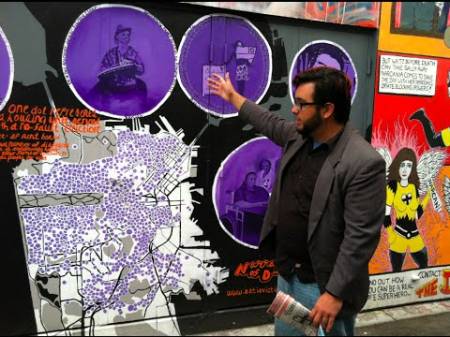
[size1]JOE RODRIGUEZ, MURAL SHOWING SAN FRANCISCO EVICTIONS IN COMPANY TOWN[/size]
A politician's campaign around the tech invasion of San Francisco
It begins with these three statements on screen: "San Francisco is the new global capital of high tech and home of 'sharing economy' companies like Airbnb, Uber, and Lyft. . .The tech boom has displaced ethnic communities and driven the middle class out of the once free-spirited city. . .A grassroots backlash against the tech invasion could swing an upcoming election, sending a powerful message." This defines this documentary's focus and its bias. It concentrates on two politicians waging opposing campaigns concerned -- or not -- with the tech invasion. They are former Board of Supervisors president Aaron Peskin and current appointed supervisor Julie Christensen, campaigning for supervisor of District Three of the city. We know which side this film is on - and it converted me. (Well, I probably didn't need converting.) And as a matter of fact, as we learn, the public went along too. Peskin, the grassroots, anti-corporate hero of Company Town, indeed wound up beating tech development friend Ms. Christensen in the election.
Joe Fitzgerald Rodriguez is a San Francisco Examiner correspondent covering the fight for political control in the Mission district, Ground Zero for the conflict of local natives vs. tech billionaires wishing to buy political power in the city. Young Rodriguez, a local native and the film's main non-political talking head, laughs as he points out the dramatic recent gentrification of Valencia Street a minute away from the slummy colorfulness of Mission streets, but he doesn't exactly laugh at the map showing hundreds of evictions in the city, one of which was of his grandfather. The fact his granddad had to die of cancer shortly after being forced to move to a place not his own makes him angry and sad.
The Mission District has tech invasion Ground Zero status because it's being rapidly invaded. But the key segment of the city is District Three, which Peskin and Christensen are contending for. This is a small district comprising the city's most iconic places. They include the elegant heart of the downtown, Union Square; the Financial District and the eastern waterfront, Fisherman's Wharf; Polk Gulch (where I lived for 16 years); the iconic hills, Telegraph, Russian, and Nob Hill; and the tourist magnets Chinatown and North Beach. All in all, that is the city, traditionally.
Julie Christensen, the District Three incumbent, says she doesn't even mention the word "tech" in her campaign. She is strongly supported by the laissez-faire present San Francisco city mayor who appointed her, Ed Lee, who wants to let development go as it has been and encourage more of it. Peskin wants to protect traditional properties and traditional populations of the city, and is supported by labor, taxi drivers, artists, and moderate income residents and the other grass roots groups who are now endangered species.
We see that Christensen spends time in every speech attacking Peskin, her opponent, tarring him with the "bad boy" brush, making him out to be a loud, macho tough guy and a spoiler who misrepresents her. She gets a kick out of herself; she laughs warmly at her own jokes. The film doesn't want us to like her, and we don't. Her slogan is "Julie Christensen gets things done," and she would obviously represent Peskin as an obstructionist wanting to stand in the way of progress and economic development beneficial tot all -- or all who remain after the evictions, at least. (Her heart bleeds for the evicted, she tells Joe Rodriguez, it really does. . . We must find land and space for them, somewhere. . . )
Airbnb in San Francisco, it turns out, has become a cover for low-overhead hotels, multiple units taken over to use exclusively for day-rentals, pushing out moderate income residents. Peskin points this out; Christensen and tech billionaires deny it, claiming Airbnb is just a way of helping strapped locals survive in the more expensive economic environment. Peskin points out that "the sharing economy" is nonsense. Sharing, he argues, is not something you pay for. Uber drivers are not "sharing" their cars. They are using them as taxis at their own expense and getting paid below minimum wage to do so. Each "sharing" branch is a mass of peons with a few mega-rich at the top of it.
Chinatown is an endangered site. Jeffrey Kwong, who grew up in ultra-crowded Chinatown conditions, is a young Peskin campaign volunteer (Peskin says he's known Kwong since he was 13), who acts as his interpreter to venerable members of Chinatown family societies. Kwong explains, and shows, conducting his own interview with a young Chinese tenement dweller, how the tech invasion is driving out poor Chinese immigrants - no place for them to stay anymore. Kwong must have been an ace campaigning tool for Peskin in Chinatown and illustrates Peskin's political savvy.
(Though not mentioned here, the Castro, the longtime gay district adjoining the Mission, has also seen an invasion of tech wealth.) This film shows crowds of ill-dressed Silicon Valley employees disappearing into ominous, sleek, white double-decker buses with black windows that whisk them away to work and whisk them back to their San Francisco residences so they have no interaction with the city.
The film shows Christensen casting the crucial vote for a proposition protecting Airbnb's corporation and big renters from regulation or restriction in San Francisco. Uber and Lyft are obviously ways of exploiting workers according to a "business model" far more profitable at the top than traditional taxi companies, whose employees they now greatly outnumber. They mounted a multimillion dollar campaign in the city to protect their interests. Evidently they didn't work as hard to help Christensen - whose last minute vote-getting efforts this film doesn't cover, only Peskin's -- because Peskin won -- a victory for the little guy, or so it would seem.
Kaufman and Snitow have made a clear and engaging little documentary, which avoids muddle by not questioning Peskin's points. Clearly the global "sharing economy" industry is worth a wider-ranging film - which might take in changes in other cities with different dynamics, such as the gentrification of Manhattan (and other boroughs of New York City) and the "Disney-fication" of Times Square; corporate rebuilding of large tracts of London, and so on.
Company Town, 75 mins., has its world premiere at the Mill Valley 9 & 15 Oct. 2016. It was screened as part of coverage of this festival.
-
KEEPER (Guillaume Senez 2015)
GUILLAUME SENEZ: KEEPER (2015)
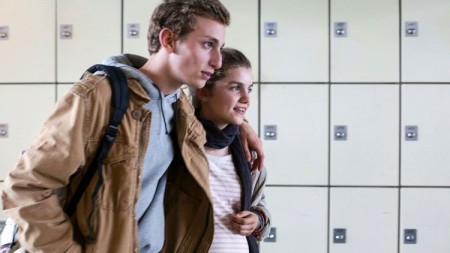
KACEY MOTTET KLEIN, GALATEA BELUGI IN KEEPER
Unexpected
Teen pregnancy is an all too familiar topic, but the Belgian director Guillaume Senez, shines in this first feature as director, giving it a fresh and sensitive treatment. Maxime (Kacey Mottet Klein) and Mélanie (Galatéa Bellugi) are a young couple, both fifteen (and the engaging actors are this very age). Max and Mélanie are a sweet and loving, if unready couple.
Surely they're in over their heads when they discover she's pregnant, and he's the father. Nonetheless, in love, they decide they want to keep the baby. The title's a bit of word play, because Max is also an aspiring soccer goalkeeper; his dad's a coach. Participating in a sports camp with the baby on his mind is more than he can really handle. They are under the shadow of their parents. While Max's mother (Catherine Salée) is exceptionally understanding and supportive of whatever the kids will decide to do, Mélanie's (Laetitia Dosch), who herself suffered the woes of being a teenage mom, is adamant in insisting on an abortion or, failing that, that Mélanie not keep the baby.
What defines this film as a superior effort is hard to put a finger on, but Keeper's rewards clearly lie in the delicate texture of individual scenes, particularly those between the gifted young Klein and Bellugi, who's equally fine. Much of their dialogue is improvised, creating a valid sense that Max and Mélanie, wading into deep waters, aren't quite sure where they're going. The beauty of the film is that despite some losses of cool by Max and a hard line from Mélanie's mother that makes Dosch sound a bit shrill, the tone is very quiet, and this in itself helps avoid cliché.
The young cople's decision leads viewers into uncharted territory too. The ending leads us into Dardennes landscape, but without the uplift, but no miserablism either. With a final shot that can make you cry, evoking the Dardennes' L'Enfant.
It's been fun to follow the Lausanne, Switzerland native Kacey Mottet Klein ever since he was discovered by Ursula Meier (also Swiss French) for her film Home, with Isabellle Huppert and (Dardenne regular) Olivier Gourmet. I guess he was nine, and a year or so later Meier created her film Sister )L'enfant d'en haut basically as a showcase for his mercurial talents with Léa Seydoux costarring, playing penniless and abandoned siblings living by their wits on the edge of posh Swiss ski resorts. In between came Klein's priceless turn as precocious preteen squirt Serge Gainsbourg in Joann Sfar's kaleidoscopic biopic. Klein has since grown from nutty, hyper prepubescent to intense adolescent, but his performances are always fresh and unpredictable. This quiet little film shows another side of him, a youth mature for his age but challenged. Klein's career has received an important push toward stardom since with the lead role as a gay teen in André Téchiné's 2016 Being 17 (Quand on avait 17 ans). He continues to be watchable and distinctive.
Keeper, 95 mins, debuted at Locarno 7 Aug. 2015; in at least seven other international festivals in 2015 and 2016, including Toronto and Rotterdam and has has scored four festival wins and three nominations. French theatrical release 23 Mar. 2016 to rave reviews (AllloCiné press rating 3.8/18). Showing at Mill Valley Film Festival 11 and 12 Oct. 2016.
Last edited by Chris Knipp; 10-09-2016 at 11:24 AM.
-
CHRISTINE (Antonio Campos 2016)
ANTONIO CAMPOS: CHRISTINE (2016)
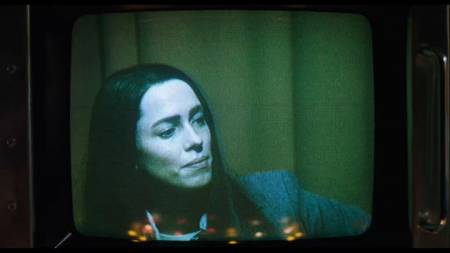
REBECCA HALL IN CHRISTINE
Too much to bear
Christine Chubbuck was a newscaster who shot and killed herself on live TV in Sarasota, Florida in 1974. By coincidence, two films about her debuted at Sundance last January. The first to be released was Kate Plays Christine, Robert Greene's study of a current-day actress preparing, with crippling thoroughness, to play the lead in a film about the event - with Kate Lyn Sheil presumably playing herself. Antonio Campos goes the direct route, with the greater success. But both films are interesting, and make quite a double bill -- to be studied in future film courses alongside Sidney Lumet's famous 1976 offshoot of Chubbuck's story Network.
Where Greene makes us think, Campos makes us feel. He plunges in and, with fullness and precision, dramatizes the original events Greene dances around. The English actress Rebecca Hall, Vicky in Allen's [URLf="http://www.chrisknipp.com/writing/viewtopic.php?f=1&t=1111]>Vicky Christina Barcelona[/URL], embodies Ms. Chubbuck and she does, from the first, a terrific job of it, the best performance of her career, backed by a superb cast and a recreation of the broadcasting and Seventies milieux with remarkable faithfulness. This is a provocative and unique movie, at once the most remarkable and most mainstream work the bold Campos has yet done. After the meta- of Greene's approach, it's part tonic, part toxic to be plunged so vividly into Chubbuck's intense, uneasy world. Campos' writer Craig Shilowich has given him a spot-on script.
Campos provides what Chubbuck's bullying TV station boss Michael (the terrific Tracy Letts) keeps calling for: juice. Do we know what led Christine to take her own life in such a dramatic way? Of course not. There are plenty of reasons. Apart the bullying, which keeps her, she thinks, from getting the opportunity to do good, serious work, she is single, dateless, a virgin, living with her mother Peg (the excellent J. Smith-Cameron) on the verge of reaching thirty. She has just learned she has an ovarian cyst whose necessary removal may make it hard to have children. She is chronically tense and socially inept, always imposing herself on people when they don't want it and withdrawing when they want to be kind and friendly to her.
All this is absurdly out of whack to the point of seeming funny sometimes; and the film revels in period, particularly the clunky accoutrements of TV on the verge of converting over from film to video when video was still pretty fuzzy and remote reports sometimes didn't play on air when called for. It's almost as if the now awkward looking styles and technology, not to mention Watergate, are themselves an unbearable burden for the sensitive, unhappy young woman -- who yet is ambitious and passionate about her work and wants so much to succeed. One of the last straws is learning that the smooth but unambitious anchorman George (Michael C. Hall) and "the little blonde number in Sports” have been tipped by the station owner for promotion to his new outlet in Baltimore, and she's been passed over. We can see very well why, and feel also that it's a shame. She's pretty and ambitious, and even the mean Michael acknowledges she's the smartest person at the station.
But probably the crisis arises not from any of this, nothing in particular, anyway. We learn that Chris got “all turned around” from something in Boston and has come to Florida for peace and quiet, but not found it. The darkness and discontent are inside. But they make what's outside understandably too much. This is one of the most restrained and convincing portraits of psychological meltdown on film. And Campos does it straight, with none of the chilly abstraction he delivered in his earlier Afterschool (starring Ezra Miller) and Simon Killer (with Brady Corbett). Campos has matured and fulfilled his promise here, ably supported by Shilowich's screenplay.
There are many admirable little touches, and the best thing is so many are neither obvious nor obligatory. There's the strange, absurd garage owner with the back room gun warehouse who loans Chris a pistol. Her little puppet shows performed as a volunteer at a children's hospital. Chris fidgeting with film and a videocamera; writing on her portable typewriter at home, composing last words on the IBM Selectric at the studio. The creepy fire victim, in shooting whom Chris has worked in "Nightcrawler" mode. Christine has lots of stuff worth coming back to.
Christine, 115 mins. debuted at Sundance Jan. 2016. Seven other festivals including Toronto, London and Mill Valley, in US theaters 14 Oct. 2016.
Last edited by Chris Knipp; 03-30-2018 at 10:08 AM.
-
SOLO/ASSOLO (Laura Morante 2016)
LAURA MORANTE: SOLO/ASSOLO (2016)
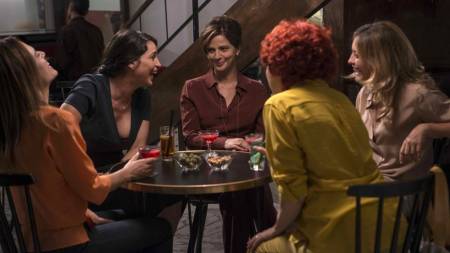
LAURA MORANTE (CENTER) IN ASSOLO
Morante looks at aging
Laura Morante's second film as a director, writer and star takes on some very serious issues. It considers the realities of growing old and being alone. But the thrust is positive: Assolo ("Solo") is an argument in favor of enjoyable solitude. Her character, Flavia, entering her fifties, has had two husbands, some lovers, two sons, and seems to be still involved with and dependent upon these men, and their current women, on a day-to-day basis. Through the course of the film, which involves much soul-searching (in voiceover) and frequent sessions with a shrink called Dr. Grünewald, Flavia comes to accept that a neighbors' mistreated dog, whom she has adopted, is perhaps all the company she really needs.
After we have seen the perfidiousness of the men in her life and the unsatisfactory nature of the new men available, we can agree with this decision. All is observed with a humane and forgiving eye in Morante's gently humorous film, which instructs, as it entertains. And yet again, despite plenty of polish and charm and the star's indestructible good looks, the result isn't wholly successful as a movie and hasn't anything truly distinctive about it. Don't et me wrong: Laura Morante, who's most remembered in this country for her performance as the mother in Nanni Moretti's beautiful and sad The Son's Room, is someone I love to watch. It just looks like I'd rather watch her being directed by someone other than herself.
Assolo is a thorough study of its protagonist's dilemmas. But therein lies the rub: explaining Flavia's circumstances takes up so much time this starts to feel like an instructional film. Though in this in many ways well-made and observant film the people in Flavia's life take hold as characters early on, it's fully two thirds of the way in before they move beyond vignettes and examples and a story starts to take hold. And as with Morante's first film as a director, [url="http://www.chrisknipp.com/writing/viewtopic.php?f=1&t=2250&view=previous"]The Cherry on the Cake[/url, Assolo has a lot of trouble establishing any kind of rhythm. This is because of a confusion of genres. The movie wavers between midlife crisis tale, wistful romantic comedy, and bourgeois satire. Some of the best moments come when Flavia's son, or his awful girlfriend, hold the screen. There is something vivid and of these times about their rude directness. But like almost everybody, except Flavia and Dr. Grünewald, they remain bit players, even though she seems only a sounding board for them.
The Cherry on the Cake was in French, and this time the French star Lambert Wilson returns the favor and appears, speaking Italian, as Flavia's sometime lover. But when he visits, it's on a business trip, and he insists on staying at a hotel because "it's more convenient." This is one of so many instances of how Flavia is slighted by the men around her. Dr. Grünewald points out that she has low self-esteem, and much of it is due to how she is being treated.
The sense of a story finally takes hold, but things are worked out only clumsily. At the end Flavia is driving out in the country in a red convertible with Kira, the little dog, at her side: victory! She has moves outside Rome and gotten a driver's license and a car. But how did she do that? We only see her failing her driving tests, repeatedly, ever more spectacularly. Is this another one of her dreams? If so, Assolo leaves things dangling. But mind you, Laura Morante has assembled a good cast and she is a wonderful-looking woman who exemplifies all that is lovely and appealing about Italian women.
Assolo {"Solo"), 97 mins., opened 5 January 2016 in Italy. It was part of the Open Roads Italian film series at Lincoln Center in June and was screened for this review as part of the Milll Valley Film Festival, October 2016.
-
DIETER BERNER: DEATH AND THE MAIDEN/EGAN SCHIELE: TOD UND MÄDCHEN (2016)
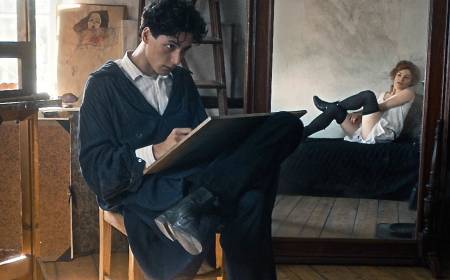
A beautiful, breezy portrait of the artist
The Egon Shiele of Dieter Berner's new film is a charmer, and the bright eyed, chiseled-featured Noah Saavedra makes that charm convincing. With his long face and windswept hair, he resembles Schiele, but is definitively prettier, and was only 24 when this film was shot. In time-honored style, the film focuses on the last days of the artist during the Spanish flu epidemic of 1918 just toward the end of the First World War, while flashing back to key moments in his adult life. He had achieved notoriety and an international reputation but was only 28. He died only three days after his wife, the bourgeois Edith (Marie Jung), for whom he'd abandoned his longtime mistress Wally (Valerie Pachner). Edith and her sister Adéle (Elisabeth Umlauft) had lived right across the street. But Wally was still around, and Edith's sister. The story the movie has to tell is of an unusual lifestyle and unique talent. Schiele was a protege of the older Gustav Klimt (Cornelius Obonya), and the two were masters of the early twentieth century Viennese style - tortured, shocking, erotic, elegant and stylish work that still looks modern. A main focus is on the artist's proclivity for painting underage women in the nude, including his 13-year-old sister Gerti (Maresi Riegner). It was essential to his convention-defying style, which involved tortured, expressionistic poses, nudity, and blatant sexuality. His always striking images make him one of the major figurative artists of the early twentieth century. It took Berner 18 months to find Saavedra for the lead role, but he shot his film in only 40 days, and it is beautiful and breezy. Here, Schiele's épater les bourgeois is not tortured but fun. Berner doesn't achieve the originality and naturalism of Maurice Pialat's Van Gogh by a long sight, but the good cheer avoids many clichés of the genre, and only the music is occasionally a little annoying.
Egon Schiele and the Death of the Maiden/Egon Schiele: Tod und Mädchen, 110 mins., debuts at the Zurich Film Festival 26 Sept. 2016, opening in Austria 7 Oct. It shows 15 Oct. at the Mill Valley Film Festival.
<Trailer.
Last edited by Chris Knipp; 02-01-2018 at 06:08 PM.
-
LAND LEGS/TEMPÊTE (Samuel Collardey 2016)
SAMUEL COLLARDEY: LAND LEGS/TEMPÊTE (2016)
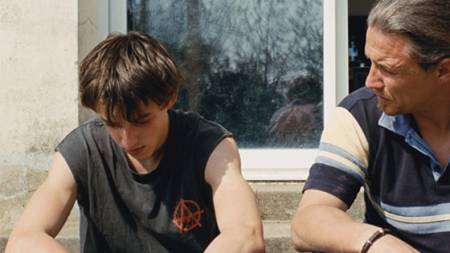
MATTEO AND DOMINIQUE LEBORNE IN LAND LEGS
Life recaptured
Samuel Collardey makes fiction-documentaries. This is a mixed genre in which real people are manipulated for the camera doing things that closely relate to their own lives. Without our knowing just how it's done, we know very well when it works. Judging by the filmmaker's debut The Apprentice/L'Apprenti (RV 2008), about a kid learning how to be a farmer, and this new one, about a deep water fisherman who must spend time on land to show up for his family, when Collardey's at the helm, it works. Without having seen the middle film of his three-film oeuvre, I'd guess Land Legs (whose French title Tempête of course means "Storm") is his most complex work in the genre yet, and an engrossing, touching film.
Dom (Dominique Leborne) is a passionate deep water fisherman who has loved fishing all his life. The director met him on an ocean voyage and fell under his spell, which is understandable. He has the gnarly good looks of the Norwegian bestseller author Karl Ove Knausgaard, and oozes charm and charisma - and a hint of sadness, which will come into play in due course. When we meet him he's at a boozy, crowded singalong at a Cork, Ireland bar. At the end of the sequence, Dom climbs atop a chair and spreads his arms, king of the feast. With its rich wide-screen 35 mm shots, the camera instantly, irresistibly captures the good feeling and warmth and draws us into the protagonist's world.
Besides the sea, Dom loves his kids, his 16-year-old adopted daughter, Mailys (Mailys Leborne), his wife's daughter by an unknown, unseen father, and his 15-year-old son Matteo (Matteo Leborne), who resembles him and shares his love of fun. Dom's times at home often begin with partying and we see a bunch of people at his house drinking and smoking joints, Matteo and Dom included. "I'm the adult here," he declares, kicking out a merrymaker, but he seems more like a big brother than a dad, though the rapport is great. He's a cool dad, and Matteo and Mailys like the freedom.
Somehow Dom manages to juggle long periods at sea with being a father. Though he and Matteo's mother are divorced, he has custody of Matteo and Mailys. Dom's mother (Chantal Leborne) fills in with the kids while he's at sea. But when Maillys gets pregnant, and the pregnancy must be terminated for medical reasons, it causes a rupture, because Dom is at sea during the crucial, traumatic event. Doubly wounded, Mailys goes to live with her mother, and a local social worker questions the status of things. Something has to change.
Dom quits his fishing job and enrolls in a four-month training course to qualify for a boat captain's license and sets about to acquire a small boat he hopes to maintain with Matteo as his first mate. But he lacks the experience or the financial resources to get the support of the fishing board or the primary loan from the bank, and he goes through a period of such penury that the cut-off heating causes Matteo also to decamp, and consider working for her new boyfriend, a mason.
The film shows how the principals weather all this in a positive way and follow Dom experiencing the realities of trying to enter a new life that doesn't really suit him.
The result is a bit of Ken Loach, a bit of the Dardennes, and a lot of Collardey. The process this time involves such adeptness in getting people to play themselves that it's almost distracting if you know they're doing that. But Collardey has successfully assembled a collection of magic moments when he caught lightning in a bottle, one lively, emotional scene after another with never a wrong note. What he did with The Apprentice was simpler, almost pure documentary, following a training period at an unspoiled country location. Here there are crowds, officials, parties, heart-to-hearts, fishing, a rough time at sea - you've got it all, above all scenes between Dom, Matteo, and Mailys that flow like magic. The Apprentice, the purer effort, did better with French critics (and it won the Prix Louis Delluc for best first film and other prizes). But this didn't fare at all badly either. Dominique Leborne won Best Actor at the debut in Venice's Orizzonti category, and the film was nominated there for Best Film.
Collardey's passion is as much visual as humanistic. At the prestigious French film school La Fémis he focused on cinematography, and he continues to shoot in 35mm and wide screen, juggling that with the speed and intimacy of catching action on the run. The screenplay was co-written by Catherine Paillé. Music composed by Vincent Girault provides background at once for the roaring sea and Dom's own tempestuous times.
Tempête/Land Legs, 89 mins., debuted at Venice 9 Sept. 2015; four other festivals. French theatrical release 24 Feb. 2016 to good reviews (AlloCiné 3.9; but The Apprentice was 4.1). Screened in connection with Mill Valley Film Festival, where it shows 11 and 13 Oct. 2016.
Last edited by Chris Knipp; 11-02-2016 at 04:11 AM.
-
THE CONFESSIONS/LE CONFESSIONI (Roberto Andò 2016)
ROBERTO ANDÒ: THE CONFESSIONS/LE CONFESSIONI (2016)
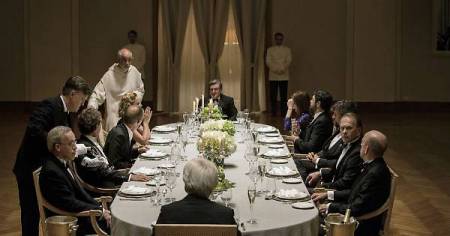
Solemn message
Sicilian-born Roberto Andò directed a film a couple years ago with Toni Servillo, Viva la libertà/Long Live Freedom. This time the protean actor dons the robes of a monk, but the theme, as before, is modern politics, or rather, this time, economics. While Long Live Freedom's plot of a politician who escapes his problems using a nutty identical twin didn't really come off, it did give Servillo an opportunity to show off his thespian skills. He should not have so much to do this time, since he's a Carthusian, and they rarely speak. (See Philip Grüning's three-hour wordless documentary Into Great Silence.) This time the point is clearer, but at the risk of being heavy-handed. For some reason the monk, who's called Roberto Salus, is invited to a gathering of the IMF for a secret G8 summit by its leader, Daniel Roché (Daniel Auteuil), who wants to confess to him. The next ting we know, after a stiff ceremony for Roché's birthday and some very choppy, irritating editing, Roché is found asphyxiated with a plastic bag over his head. The bag belonged to Salus, and the movie turns into a kind of thriller with questions about whether it was really suicide. But the real revelation is that international bankers have cold hearts, and rich people are not very good for the masses of men. If this comes as a revelation, this well crafted but stilted and humorless film will appeal to you. Saus disobeys the Carthusians' vow of silence many times over, giving way to this film's overwhelming desire to lecture us. Also starring Connie Nielsen, Marie-Josée Croze, Pierfrancesco Favino, and Lambert Wilson.
The Confessions/Le confessioni, 103 mins., opened in Italy in April 2016, and showed at Karlovy in July; scheduled for the Zurich, Vancouver, and Mill Valley film festivals in Sept. and Oct.
-
OCCUPY, TEXAS (Jeff Barry 2016)
JEFF BARRY: OCCUPY, TEXAS (2016)

LORELEI LINKLATER IN OCCUPY, TEXAS
Rebellion reconsidered
Occupy, Texas teeters on the edge between defiance and responsibility as a young man steps gingerly back into middle-class life after a long fugue into rebellion. The story was penned by the star, Gene Gallerano, who injects much wit and slyness into his role, though the movie's energy and conviction gets blunted a bit along the way.
Beau Baker (Gallerano) is a twenty-something fetched back home in Texas from New York City homelessness to shoulder mentorship of his two young sisters after their parents have died in a car crash. It seems Beau walked away from a brilliant performance in school and likely success as a lawyer seven years ago to give up chinos and polo shirts, dress hippie, and flee Texas. After some involvement in the Occupy Wall Street, he seems to have drifted into street life till rather mysteriously his Uncle Nolan (Reed Birney, VP on "House of Cards") finds him sleeping on the street and summons him back to Dallas. His parents have listed him not only as executor of the estate but legal guardian his two teenage sisters, 17-year-old Claire (Lorelei Linklater of Boyhood) and 13-year-old Arden (newcomer Catherine Elvir). His ambitious aunt Uma (Peri Gilpin) is outraged, but duties take her out of town and leave the three siblings to sort things out.
Somehow the chronology doesn't seem altogether well worked out for Beau or these events clearly placed in a context. Nonetheless for a while it is fun watching the fast-talking Beau parade around his family's posh suburban world with beard, high-concept haircut, and tattered, punkish clothes. He is defiant and irresponsible - it's hard to reconcile his childishness with either his former promise or his recent social consciousness - but he also reluctantly shoulders some of his responsibility toward the girls, though setting things up for them to take an open-ended bereavement leave from their stuffy Catholic school. Young Arden warms to Beau's ways and they bond nicely, but Claire is angry and defiant, so his job is difficult even in the moments when he shoulders it. The situation dramatizes Beau's need to assume adulthood and perhaps accept that he may be able to accomplish more good in the very world of privilege he was born into than as a tattered dissident elsewhere.
Garry and Gallerano deliver some amusing dialogue and the film is frequently good in the moment, even though the overall story arc sometimes falters. Much happens and yet not a great deal leaves a deep impression. It's not clear where things are meant to be going, perhaps because Beau's personality isn't very well defined or his transformation sufficiently delineated. He has a fling with a married woman (Janine Turner), and though his ex-girlfriend Sherry (Nikki Moore) is married and also guidance counselor at his sisters' school, she seems easily swayed to spend time with him, and the girls. Somehow there's a big party at the house where underage kids are found drinking and he's temporarily arrested and Claire is threatened with expulsion from school.
Locals attest that the filmmakers have made good use of authentic Dallas settings and landmarks, including the distinctive Lakewood Tuscan Villa used as the Baker residence around the corner from where Gallerano himself grew up, and they have assembled a very good cast all down the line. Scenes between Beau and old best buddy Kelsie (David Matranga) show what relaxed, authentic moments the film is capable of when it's not trying too hard. Gallerano is an unmistakable talent, and we look forward to more from him and director Barry.
Occupy, Texas, 93 mins., debuted at Dallas International Festival 15 April 2016, playing also at the New Jersey, Myrtle Beach and Mill Valley film festivals. It was screened as part of the latter for this review and shows there 13 and 14 Oct. 2016. Theatrical release planned for 15 Apr. 2017.
-
WHAT'S IN THE DARKNESS (Wang Yichun 2015)
WANG YICHUN: WHAT'S IN THE DARKNESS (2015)
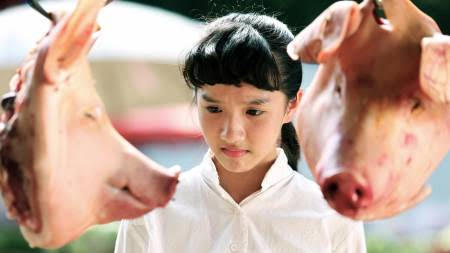
SU XIAOTONG IN WHAT'S IN THE DARKNESS
Girls in trouble
Wang Yichun's debut feature What's in the Darkness, a girl's coming-of-age story in rural northern China in the Nineties, is also, or seeks to be, as Maggie Lee wrote somewhat grandly in her Variety review, "Perhaps the most acute and uncompromisingly grim murder mystery to come out of China in years." The interweaving of the two is a considerable feat, executed with surgical precision, a sense of period, and an eye for landscape and well orchestrated little human panoramas - police in tall grass investigating a crime scene, children and young punks in a classroom, a street market. Maybe we shouldn't be too disappointed if such an ambitious mix winds up being somewhat thin on atmosphere. One longs for the passion and nostalgia of Edward Yang's A Brighter Summer Day or the dreamy stylishness of Tsai Ming-liang's Rebels of the Neon God, both incidentally from the early Nineties when Wang's story takes place. Still her intermingling of ambition and restraint is impressive if not engaging.
What unites the two story lines, in a manner that's both ironic and chilling, is sexuality. The general mood of the provincial society is a mix of prurient and repressive. Adolescent schoolgirls are discovering theirs; the murder mystery is a series of related rapes and killings of young women. The two girls in the foreground whose contrasting life paths are in view, the shy Jing (Su Xiaotong) and sensuous, rebellious Zhang Xue (Lu Qiwei), are the daughters of two of the main policemen on the case, whose methods are also in sharp contrast. The effect isn't as schematic as it sounds, because Wang's constantly shifts scenes and keeps them short, which leaves time for many small plot threads and has a cooling down effect . Maggie Lee's claim that "the performances are superbly natural across the board" fails to account for how shrill and overstated is the acting of Guo Xiao playing Qu Zhicheng, Jing's father. He's a detective who studied forensics, and he aims to be scientific and logical in tracing down the killer, while Zhang Xue's father (Zhou Kui), also a detective, just wants to put somebody away ASOP.
The mutilated and raped bodies of young women keep turning up. Meanwhile Jing is drawn into such wicked things as nail polish and a hairdresser's by Zhang Xue. Zhang Xue has a raucous boyfriend; Jing is followed by a rather sweet kid, who yet gets rounded up briefly as a sex offender. Even Jing is caught with a group about to watch a sexy movie on a videotape, when morality police come in ard round them up. Jing volunteers at a retirement center, and even there an old man puts the make on her. She comes in for continual abuse from both father and mother (Liu Dan). He sees even Jing's straddling a bike as sexual now that she's maturing. There is no warmth, no comfort anywhere, except there is the charm of Jing's enthusiastic performances of pop songs standing on a platform in a vacant lot. The boy who is keen on her she catches tape recording them, and in the nicest moment after she's forgiven him and they've become friends, he climbs up on the platform with her and they do a duo performance.
[i]What's in the Darkness/黑处有什么 [Hei chu you shen me], 100 mins., debuted at FIRST International Film Festival, also Berlin, Titanic, Singapore and Melbourne, New York Asian Film Festival at Lincoln Center (North American premiere) and also Mill Valley (15, 16 Oct. 2016), as part of which it was screened for this review.
Last edited by Chris Knipp; 12-02-2016 at 10:41 PM.
-
THE SALESMAN (Asghar Farhadi 2016)
ASGHAR FARHADI: THE SALESMAN (2016)
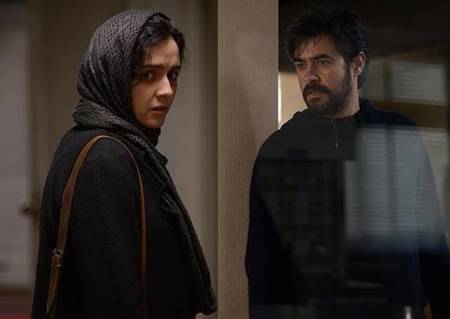
TARANEH ALIDOOSTI, SHAHAB HOSSEINI IN THE SALESMAN
Revenge tragedy
Most (western) reviewers who've written about this film have seen four of the director's other ones, though there are two others in his filmography, Danse dans la poussière/Dance in the Dust (2003) and Beautiful City (2004). We all saw A Separation (NYFF 2011), which made Farhadi internationally famous, and has gotten the highest critical praise. Then we were treated to his next one, also extremely well received, which was shot in France with dialogue mostly in French, Le passé/The Past (2013). Afterward came delayed US re-releases in 2015 of his 2009 About Elly, and early this year, going further backward, of his 2006 Fireworks Wednesday.
I'm glad to have seen these two earlier films, because personally I was put off by the way A Separation seemed to heighten some of the worst aspects of Iranian culture, the quarrelsomeness, the blaming, the lying, and Le passé felt like a more claustrophobic and stifled foreign version of the same thing, not quite as good as the raves said, finely crafted, complex, but a bit tedious as well. About Elly, with its L'Avventura-like tale of a vanished girl at a seaside resort, has great ensemble work, and Fireworks Wednesday has a lovely flow to it. They are both pleasanter and lighter, and show Farhadi's gift for orchestration and movement and wrangling groups of people in a way that's both virtuosic and pleasing. It was these two that made me see Farhadi had something special.
Some are saying it's more of the same thing as the first two we saw, but The Salesman, though having in common the very generic theme of something going wrong in a family, still feels quite different, especially at the end - which, though a bit extreme, is still one of the strongest things Farhadi has ever done.
To begin with The Salesman is complicated by a combination of several different milieux: a home - which keeps changing, and is terribly compromised on doing so; a classroom, because the husband, Emad (Shahab Hosseini, also featured in About Elly and A Separation), is a high school literature teacher with a classroom fully of adolescent boys; and a theater, because he and his wife Rana (Taraneh Alidoosti, who starred in Beautiful City and About Elly) are amateur actors cast as Willy Loman and his wife in a Farsi production of Arthur Miller's Death of a Salesman (though this play-within-a-film element is the least effective).
The action begins with a sudden emergency. Due to construction nearby, the apartment building Emad and Rana have just moved to has to be immediately evacuated because it is judged about to collapse. Windows crack scarily, and so do walls. Actually the building does not collapse, but it's unsafe and the couple and everyone else must move out at once.
The chaos in the building exemplifies Farhadi's skill at directing groups of people running around. But I found it felt very artificial, like action on a theatrical stage - and we know Farhadi started out in theater. This bad impression is immediately offset, however, by a scene of Emad teaching his class. I was struck by how real and lively the geeky boys seemed, many of them in glasses - a contrast to the impossibly glamorous youths in posh Paris lyçées shot by Christophe Honoré say, or recently by Mia Hansen-Love. Farhadi's good with kids too, and did some shrewd casting here with the boys.
Their theater colleague Babak (Babak Karimi, another Farhadi regular) proposes Rana and Emad move into an apartment he has which has just been vacated, and they take it at once. This is where the real trouble begins. The previous occupant has refused to come and get a roomful of possessions, whic they put outside, and then have to move when it rains. It turns out she "had many acquaintances" - in other words, she was a prostitute. (There is a parallel character in Death of a Salesman). Then, Rana buzzes open the downstairs entrance, thinking it's Emad, and gets in the shower leaving the apartment door open. She is assaulted in the shower by an intruder, leading to a head injury requiring X-rays. But what's worse, this event, whose details are left vague (was she raped? attacked? or did she just fall?), leaves Rana badly traumatized.
At first she can't function and a performance of the play is cancelled. Then she breaks down during a performance because a man in the audience, she says, looked at her like the stranger who entered the bathroom.
Emad is impatient with Rana about all this, not really understanding, and then it becomes clear that he's not only angry at her for somehow allowing this to happen and not being able to put it behind her but also because his manhood is lessened for not protecting her. Finding the perpetrator and exacting revenge now become his goals. The key to finding the man is that he left behind a pickup truck. Later it disappears, but Emad is able fo find it.
Farhadi continues his method of almost plodding, neorealist detail, particularly in the way he describes the vicissitudes the couple's relationship goes through. But while the importance of the domestic picture, the classroom, and the theater keeps being balanced, the story turns into a kind of whodunit and a grimly realistic and incredibly tense revenge tale with a disturbing final twist.
At Cannes Peter Bradshaw invented the conceit of "The Haneke/Antonioni Shock Event," which he suggested as a new "genre of world cinema" exemplified by this film as well as Cristian Mungui’s Graduation and ("to a lesser extent") the Dardennes' The Unknown Girl (those two included in Filmleaf's 2016 NYFF coverage). There is something of Haneke in the unease that pervades the homes Rana and Emad are forced to occupy and the scary, life-changing moment of violence - its mysterious menace is reminiscent of Haneke's Code Unknown. Evan the brutality and violence of Farhadi's ending may have something of Haneke.
Bradshaw calls Farhadi's plot "contrived" and this charge can be brought. Emad's finding of the perpetrator ("The Man," Farid Sajjadi Hosseini) may have something of contrivance about it, and to some the finale seems to feel melodramatic. But I simply fell under the emotional power of the final sequence, especially gripped by the way Emad appears to be embarrassing himself and digging a hole from which his marriage may never safely emerge. Returning to the couple playing the tragic finale of Death of a Salesman is memorable, Farhadi making his theatricality work for him in a haunting and thought-provoking way.
An earlier scene memorably foreshadows Emad's dangerous path to come. He shows his boys a movie and dozes off - neither he nor Rana can sleep after her trauma - and when the boys take comic selfies of themselves with their sleeping teacher and he awakes, he becomes furious and tries to humiliate one of the boys. It's funny classroom horseplay that hints at the grim destructive path Emad is headed toward.
Le Client/The Salesman/فروشنده (farushande),125 mins., debuted at Cannes May 2016, where Shahab Hosseini won Best Actor, the script won Best Screenplay, and the film was nominated for the Palme d'Or. It also showed at 22 other international festivals including Munich, Toronto, Mill Valley, Vancouver, and London. French theatrical release 9 Nov. 2016 (AlloCiné press rating 3.4/34, critically least successful of the four featured there). US theatrical release 27 Jan. 2017, in New York at Angelika Film Center and Lincoln Plaza Cinemas 6, in Los Angeles at Laemle Royal. San Francisco area release 3 Feb. Despite early comments that it was not up the the director's best, the English-language critics' ratings have overall been very positive, judging by Metacritic's score: 83%.; but Separation was in the 90's.
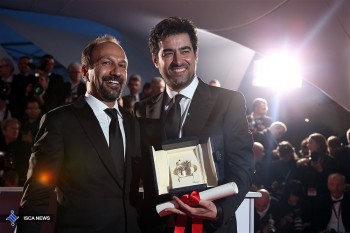
FARAHANI, HOSSEINI AT CANNES AWARDS
Last edited by Chris Knipp; 02-02-2017 at 01:34 PM.
-
JEREMIAH TOWER: THE LAST MAGNIFICENT (Lydia Tenaglia 2016)
LYDIA TENAGLIA: JEREMIAH TOWER: THE LAST MAGNIFICENT (2016)
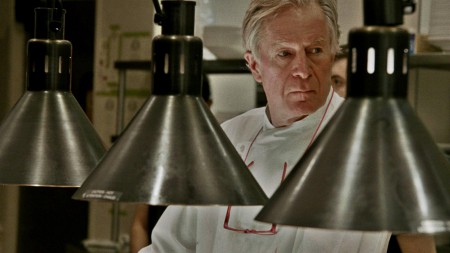
JEREMIAH TOWER
Portrait of a pioneer of the new American cuisine
The most remarkable part of Jeremiah Tower: The Last Magnificent - the phrase is associated with bon vivant writer Lucious Beebe, a role model of Tower's - is the beginning. In it Tenaglia, producer of food films, especially with Anthony Bourdain, recreates her subject's grand but lonely childhood as a solo gourmet diner at grand hotels and in first class on luxury liners, forgotten by his rich vagabond parents. They spent long periods abroad. Once as he tells it his parents were surprised to find him on a boat dining by himself. Each thought the other had sent him to boarding school. Played by the exceptionally self-possessed young Rocston Issock, the pre-teen Jeremiah is seen dining alone, in style, in grand settings - these evocative, odd, stagings alternating with old footage showing the boy's parents dressed rich. To some viewers this introduction is overblown. I found it a welcome departure from documentary routine.
This childhood made Jeremiah Tower into a lonely sybarite whose comfort was fine food, which as a student at Harvard he began producing for the entertainment of himself and fellow classmates. It also made him into a closed, mysterious person, a quality doubtless augmented by having an alcoholic mother and abusive father and growing up gay in the fifties. (He says his greatest misfortune is not having been an orphan.) Tower's secrets the various talking heads say they have never penetrated. Tenaglia uses other found or period footage to recreate in more detail earlier times, and show the man's link with elegant, traditional fine cuisine, which he was to help revolutionize. His foothold in traditions of earlier high style dining, which younger chefs are described as lacking, is reflected in his greatest success, the San Francisco Civic Center restaurant Stars which lasted fifteen years from 1984 to 1999. The film jumps around a bit, turning more into a conventional food history, but the haunting early sequences leave their mark.
Jeremiah Tower is tall, handsome, and elegant. In 1972, taking over from Victoria Wise, he became one of the first and the most famous chef of Berkeley's Chez Panisse, the restaurant credited with being the origin of the new California cuisine, with a casual emphasis on the south of France and reveling in the best local ingredients. Tenaglia makes liberal use of old footage of Jeremia and Alice Waters, Chez Panisse's guiding spirit, cooking together in the kitchen. Rumor had it that they may have had an affair; the attractive Tower, in the hothouse kitchen atmosphere, swung in different ways. He says they did not, as rumored, fight. But he left when Waters' first Chez Paniesse cookbook came out and she claimed all the dishes he and others had created were hers, only mentioning the other cooks by their first names in an opening general thanks. Waters is not one of the many talking heads here. He went to the Santa Fe Grill, at an old Berkeley railway station (is this mentioned?), and on to Stars later.
The film devotes plenty of time to Stars, an extraordinary and for a while enormously successful restaurant with an open visible kitchen and a long bar that was the center of attention. The restaurant mixed socialites and punks who could see and be seen. Tower was omnipresent, charming, keeping a keen eye on every dish that came out of the kitchen. Batali and Bourdain say it was more important and more innovative in its time than Chez Panisse. There is ample film footage of Stars in its glory, which began to fade with the 1989 Loma Prieta earthquake, which devastated the Civic Center area. How did it last another ten years? Eventually it lost too much money and closed. This film is probably a better portrait of Stars restaurant as a social phenomenon than of the birth of new American cuisine. Tenaglia provides a wealth of information about Tower's life and career. But she still omits certain essential linking details, and jumps around in time in a confusing way.
The nostalgic portrait of the lonely child gourmet fades in favor of a bevy of talking heads interspersed with period footage. Old Harvard friends alternate with chefs like Anthony Bourdain, Wolfgang Puck and Mario Batali. But the film also goes to Merida, Mexico, where Tower, whom we hear from frequently in voiceover, now lives in quiet grandeur. We see him preparing a dinner of octopus for himself, and climbing a Mayan ruin in slippers, and scuba diving. A Harvard interest was architecture, and he designed undersea buildings. It's left sketchy here, but he has spent some years rehabbing and reselling buildings in Merida. A late episode, time-lined from 2014 to 2015 and covered live by the filmmaker, is his return after disappearing, as perhaps the first celebrity chef, to try to revive the Tavern on the Green on the West Side in New York City. This is even better coverage than of Stars, but it's the story of a failure. Tower's revamp got a great review, then a bad one; Tower departed due to differences with the owners - when the bad review caused them to take over the food as well as the restaurant, knowing nothing about it. The Tavern on the Green was too big, but Tower evidently took it on because its grandeur reminded him of early days. We see him walking away into Central Park, as a talking head proclaims him the loneliest man in the world.
Maybe so, but wherever he is, however bad his luck or his strategies, Jeremiah Tower lives and eats well and his importance, lost touch with in his long absence, may be reasserted by this film. "He’s a hero of mine," Anthony Bourdain said in a San Jose Mercury article two years ago. "Jeremiah was a true innovator, an important original, and probably the first American chef anyone wanted to see in the dining room. He was an integral part of a power shift that has changed menus all over the world."
 Posting Permissions
Posting Permissions
- You may not post new threads
- You may not post replies
- You may not post attachments
- You may not edit your posts
-
Forum Rules






 Reply With Quote
Reply With Quote














Bookmarks